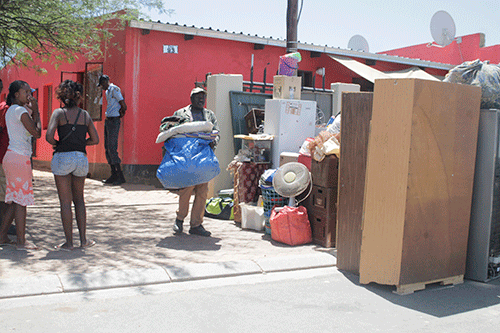Parliamentarian Veikko Nekundi this week again took issue with the country’s commercial banks. Speaking in the National Assembly (NA), he claimed ordinary Namibians have been suffering at the hands of these entities.
During contributions on the Magistrates and High Courts Amendment Bills in the NA, Nekundi charged that commercial banks are heartless because they are happy to gain at the expense of ordinary people, and “celebrate when
they chase people into a roofless environment”.
“It is unheard of, when everyone is under financial stress, the banks - whose profits are protected by laws - are making billions in profit. Therefore, the Bill must have no mercy on the banks. Instead, it must in the real sense and meaning advance the interests of people,” he demanded. Nekundi said the repossession of a house is an unfortunate circumstance for many homeowners.
Recently, there has been growing cause for concern as repossessions are occurring more frequently, particularly for primary homes, due an economy still recovering from Covid and reeling from high global inflation, rising interest rates and constrained supply lines.
Unfortunately, this difficult economic climate is creating more defaulters, as it prevents many from settling their debt.
Last year, government, via the justice ministry, commenced with consultative meetings with key stakeholders to amend legislation to prevent vulnerable persons from losing their primary homes. This comes as local banks foreclosed on houses valued at N$230 million during the first six months of 2021.
The High Court Amendment Bill was originally tabled in the National Assembly in 2021. However, debates in the National Assembly centred around the inadequate protection afforded to the rights of homeowners, and how the courts are not granted sufficient discretionary powers to intervene where someone is about to lose their primary home.
Motivating the amendments in the National Assembly this month, justice minister Yvonne Dausab noted that the consultations were also aimed at ensuring that there is no grave encroachment on financial systems in place.
“It is common course that home loan accounts make up a significant part of commercial banks’ activities. Also, we could not ignore that those financial institutions play an important role in the economic life of the country. It is, therefore, important to balance the competing interests,” the minister motivated.
After the process of research and incorporating the amendments for nearly two years, Dausab said the bill has now had changes incorporated, which are primarily aimed at the imposition of restrictions on the sale of immovable property, especially primary homes.
“Arguably, international human rights law recognises everyone’s right to an adequate standard of living, including adequate housing. The government’s paramount objective should, therefore, be to keep borrowers in their homes wherever feasible, making repossession of primary residences to be an option of last resort,” she added.
The proposed legislation for the first time defines the meaning and scope of a primary home to afford protection to all those who utilise any form of immovable property as their place of primary residence.
The minister observed that with the Bill, courts will be empowered to grant alternative orders such as rescheduling debt repayment periods, or authorising payment holidays as forms of relief to enable debtors to secure other sources of income. The courts will also be empowered to make any other determination to enhance the chance for debtors not to lose their primary homes.
Meanwhile, the Bank of Namibia reports that on average, Namibian families pay back bank loans with a minimum of 17.8% of their income. Up to the end of June last year, commercial banks had repossessed unsold residential properties for a total of N$251 million during the previous five years.


